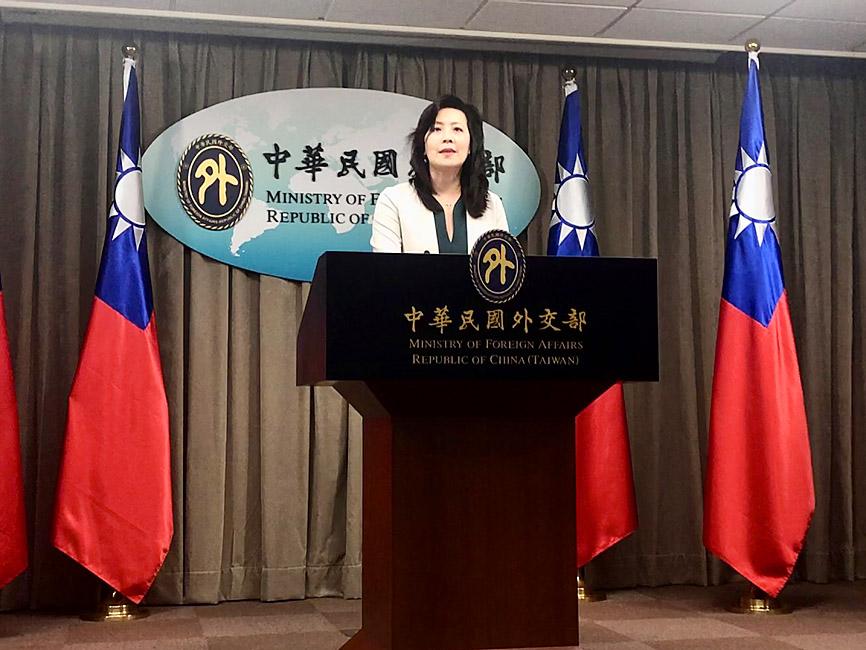The Ministry of Foreign Affairs yesterday commended the University of British Columbia (UBC) for “resuming its academic autonomy,” after the school said it would refer to the nation as “Taiwan,” instead of as “Taiwan (Province of China)” as it had done in an annual report.
In its Enrolment Annual Report 2019-2020 published earlier this year, the Canadian university referred to the nation as “Taiwan (Province of China)” in a table breaking down international students’ countries of citizenship.
In the report’s 2018-2019 edition, the school had referred to the nation as “Taiwan” without any parenthesized note.

Photo: Lu Yi-hsuan, Taipei Times
After the Taipei Economic and Cultural Office (TECO) in Vancouver lodged a protest against the error in the latest report, the university said the reference would be corrected.
The school said the mistake was inadvertently caused by a move to a standardized computer terminology and that it has implemented a fix, according to a Chronicle Herald report yesterday.
UBC is non-partisan and “does not take stands on political issues,” media relations senior director Kurt Heinrich was quoted as saying by the newspaper.
“Moving forward, UBC will only refer to Taiwan without any additional descriptors in future reports,” Heinrich said.
He said the university had adopted International Organization for Standardization (ISO) data standards for country codes, which “use United Nations sources to define the names of countries.”
The UN considers Taiwan a Chinese province. Canada has no formal diplomatic ties with Taiwan.
“It is important to be clear that the utilization of ISO data standards is not indicative of the university taking a position regarding Taiwan,” Heinrich said.
The ministry is glad to see the university resume its academic neutrality and autonomy, ministry spokeswoman Joanne Ou (歐江安) told a news briefing in Taipei.
The ministry lauded the university for understanding the essence of the problem and its willingness to correct the inappropriate appellation, she added.
However, the error remains in the school’s published report, while the ministry has instructed the TECO in Vancouver to continue to express the nation’s stance and monitor developments, Ou said.
Chinese students at the university outnumber students of other nationalities and their numbers have been increasing over the past few years, followed by students from India and the US, the 2019-2020 report showed.
Beijing has ramped up a campaign to have foreign firms and organizations identify Taiwan as part of China, and often to directly name it as a Chinese province.
Taiwan strongly objects to this, saying that it has never been part of the People’s Republic of China and that Beijing has no authority over the nation.
In March, Baltimore-based Johns Hopkins University backed down on how it refers to Taiwan on a map detailing the spread of COVID-19 after Taiwan protested its inclusion of the nation as part of China.

MAKING WAVES: China’s maritime militia could become a nontraditional threat in war, clogging up shipping lanes to prevent US or Japanese intervention, a report said About 1,900 Chinese ships flying flags of convenience and fishing vessels that participated in China’s military exercises around Taiwan last month and in January last year have been listed for monitoring, Coast Guard Administration (CGA) Deputy Director-General Hsieh Ching-chin (謝慶欽) said yesterday. Following amendments to the Commercial Port Act (商港法) and the Law of Ships (船舶法) last month, the CGA can designate possible berthing areas or deny ports of call for vessels suspected of loitering around areas where undersea cables can be accessed, Oceans Affairs Council Minister Kuan Bi-ling (管碧玲) said. The list of suspected ships, originally 300, had risen to about

DAREDEVIL: Honnold said it had always been a dream of his to climb Taipei 101, while a Netflix producer said the skyscraper was ‘a real icon of this country’ US climber Alex Honnold yesterday took on Taiwan’s tallest building, becoming the first person to scale Taipei 101 without a rope, harness or safety net. Hundreds of spectators gathered at the base of the 101-story skyscraper to watch Honnold, 40, embark on his daredevil feat, which was also broadcast live on Netflix. Dressed in a red T-shirt and yellow custom-made climbing shoes, Honnold swiftly moved up the southeast face of the glass and steel building. At one point, he stepped onto a platform midway up to wave down at fans and onlookers who were taking photos. People watching from inside

Japan’s strategic alliance with the US would collapse if Tokyo were to turn away from a conflict in Taiwan, Japanese Prime Minister Sanae Takaichi said yesterday, but distanced herself from previous comments that suggested a possible military response in such an event. Takaichi expressed her latest views on a nationally broadcast TV program late on Monday, where an opposition party leader criticized her for igniting tensions with China with the earlier remarks. Ties between Japan and China have sunk to the worst level in years after Takaichi said in November that a hypothetical Chinese attack on Taiwan could bring about a Japanese

The WHO ignored early COVID-19 warnings from Taiwan, US Deputy Secretary of Health and Human Services Jim O’Neill said on Friday, as part of justification for Washington withdrawing from the global health body. US Secretary of State Marco Rubio on Thursday said that the US was pulling out of the UN agency, as it failed to fulfill its responsibilities during the COVID-19 pandemic. The WHO “ignored early COVID warnings from Taiwan in 2019 by pretending Taiwan did not exist, O’Neill wrote on X on Friday, Taiwan time. “It ignored rigorous science and promoted lockdowns.” The US will “continue international coordination on infectious